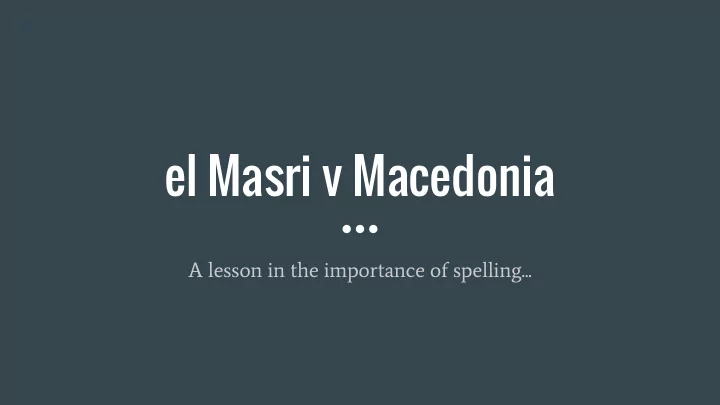

el Masri v Macedonia A lesson in the importance of spelling...
Khaled el Masri, the holiday maker: Some Facts Khaled was born in Kuwait to Lebanese parents and was raised in the Lebanon. Khaled emigrated to Germany because of the Lebanese civil war in the 1980’s To date @76’000 remain IDP’s and 1m left the country as a result of the conflict. In Germany Khaled married, divorced, remarried and subsequently had 5 children in the German City of Ulm. In 2003 Khaled travelled from his home to Skopje, in Macedonia for a holiday.. So far Khaled sounds fairly regular….
Khaled, The Prisoner: Some Facts December 31st 2003: Khaled was detained by Macedonian Border officials and detained without charge at the Skopsi Marek Hotel January 23rd 2004: Khaled was released by Macedonia and was immediately detained by the CIA acting on information provided by Macedonia. January 23rd 2004: Skopje Airport; The CIA employed ‘Capture Shock’ techniques. January 23rd 2004: The CIA removed Khaled in an Extraordinary Rendition to Afghanistan via Iraq.
Extraordinary Rendition: What is it? The extra-judicial transfer of an individual from one state to another for the purposes of detention. Status: Illegal under International Law Basis: Erga Omnes norm Basis: Casus Belli from Grotius Basis: UN declared extraordinary rendition as a crime against humanity.
Khaled’s Detention During Khaled’s detention he described how he was: Stripped Deprived of senses Kept in a bare cell Hooded Fed meagre food Kept in squalid conditions Shackled Given putrid water Force-fed Sodomized Humiliated Not allowed due process Drugged Not given access to medical care Never Charged...
Khaleds Release Khaled was released on the 28th of May 2004 after 151 days of being detained. Khaled was released without charge. Khaled was released without information. Khaled was released in the middle of the night. On a deserted road. In Albania. Khaled was not a terrorist. Khaled was detained for 151 days because the head of the CIA division for al-Qaeda investigation thought his name sounded similar to Khaled al-Masri
Fast Forward to 2012 … . Despite never being charged or even told why he had been detained in the first place Khaled did not receive any compensation or explanation from the US. The regional ECtHR applied the ECHR when Khaled applied for damages for the mistreatment experienced in Macedonia and transfer to US custody. Khaled had failed to achieve redress on 3 separate occasions in the US Court System and 2 separate countries requested arrest of those involved, none were successful.
Other Judicial Decisions The American Civil Liberties Union applied to the District Court in Virginia on Khaled’s behalf, the court dismissed the case citing the state had successfully made out ‘State Secrets Privilege’. The Court of Appeal confirmed this dismissal. The US Supreme Court refused to allow an appeal. Khaled also sought redress in the FYR Macedonia where there were ‘substantial procedural failings and omissions’.
ECtHR: Reference to international instruments Art 7 + 9 ICCPR UNGA Res 60/148 Art 1 + 2 + 3 + 4 ICPAPED UNHRC Res 9/11 + 12/12 Art 7 + 14 + 15 + 16 ARSIWA Venice Commission 2 Special Rapporteur Reports Council of Europe Res 1433 + 1463
ECtHR: Method Extremely Rigorous: Procedure Admissability Merits Principle Application Conclusion
ECtHR Finding Despite references to other international instruments the instant Court does not have competence to decide on their application. Whilst due regard is held for them the Court found the following breaches of the ECHR: Art 3 (prohibition of torture) Art 5 (right to liberty and security) Art 8 (right to respect for private and family life) Art 13 (right to an effective remedy)
ECtHR Findings Art 10 Breach failed to be made out. Art 41 remainder dismissed 267. The applicant claimed 300,000 euros (EUR) in respect of non-pecuniary damage for the suffering, anguish and mental breakdown linked to his ill-treatment, unacknowledged detention, uncertainty about his fate, the refusal of the Government to acknowledge the truth and the impossibility of restoring his reputation. In the latter connection, he claimed that he had been subjected to a “defamatory campaign”, which had had a negative impact on his employment prospects. In support of his claim, he referred to similar cases in which the governments of Sweden, Canada and the United Kingdom (see paragraphs 110 and 129 above) had been ordered or had agreed to pay compensation of between 450,000 United States dollars (USD) and USD 10,000,000. He further requested that the Court order the respondent State to conduct an effective and thorough investigation into the facts of his case. The applicant did not claim any award in respect of pecuniary damage.
Award: 270. Consequently, regard being had to the extreme seriousness of the violations of the Convention of which the applicant was a victim, and ruling on an equitable basis, as required by Article 41 of the Convention, the Court awards him EUR 60,000, plus any tax that may be chargeable on that amount (see Ilaşcu and Others , cited above, § 489). €397.35 per day of torture €591.78 per day for ECtHR Judge. Every day. Sitting. Travelling. Holidaying. Free.
Recommend
More recommend